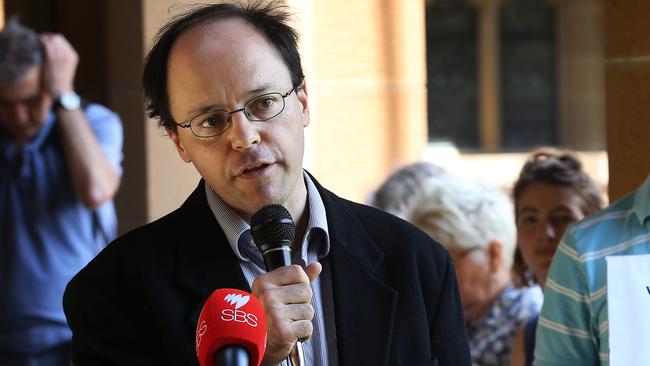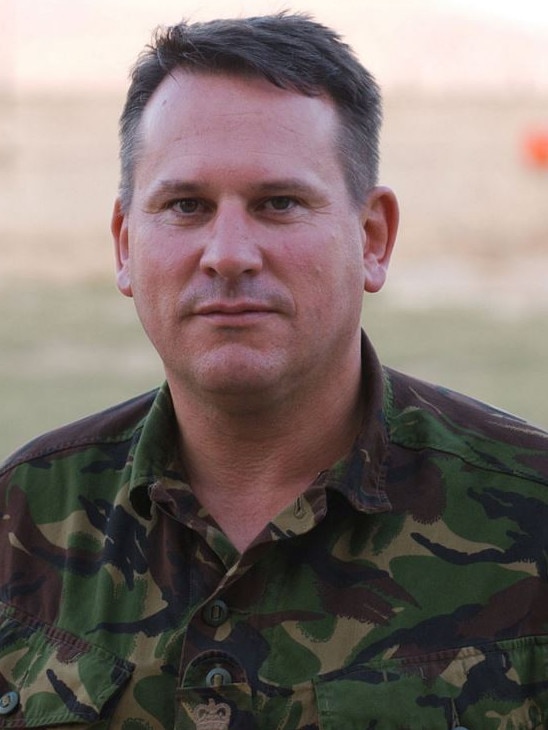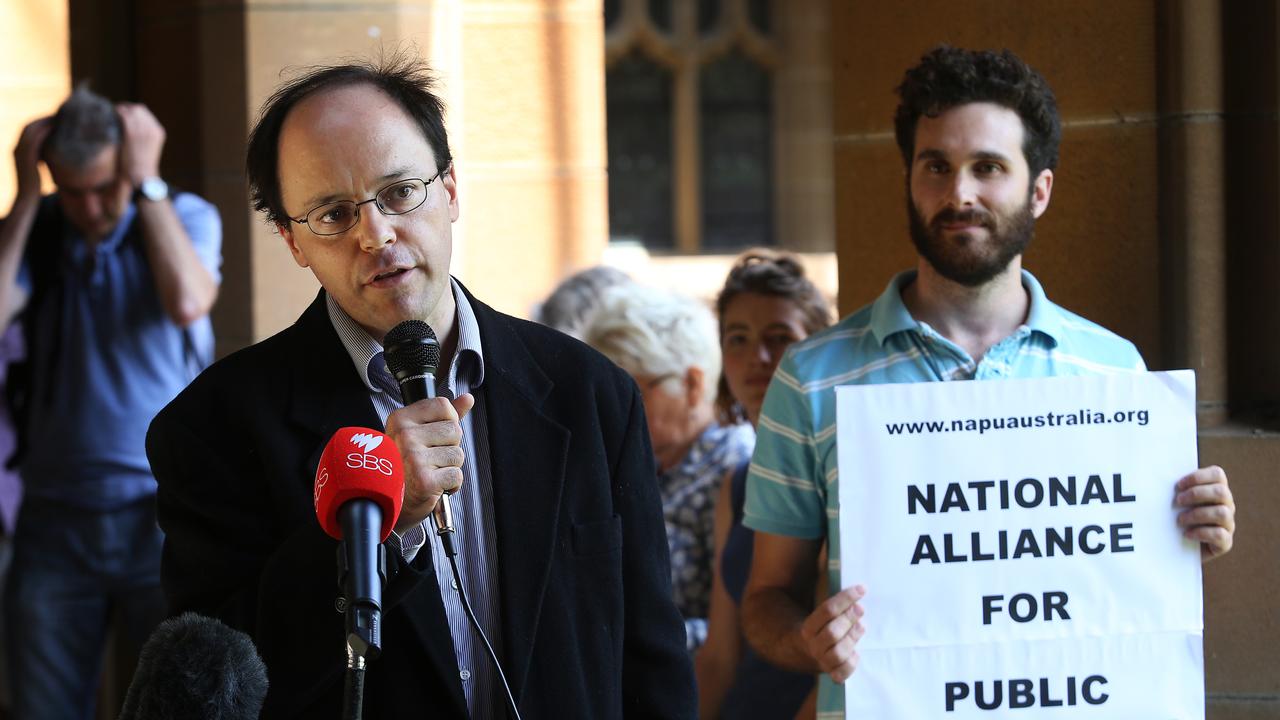
It is a sad reality that our universities are succumbing to that imbecilic American practice of providing so-called ‘safe spaces’ for students traumatised by politically incorrect facts. Now it appears they have to do the same for infantile lecturers.
I’m a linguist. My discipline long ago stopped thinking some languages are better than others. It’s deeply shocking to me, intellectually & politically, that in 2018, at @Sydney_Uni, we’re having to argue against a course predicated on the superiority of the West. #RamsayCentre
— Nick Riemer (@NickRiemer1) September 7, 2018
“I’m a linguist. My discipline long ago stopped thinking some languages are better than others,” tweeted University of Sydney academic Dr Nick Riemer last month. “It’s deeply shocking to me, intellectually & politically, that in 2018, at @Sydney_Uni, we’re having to argue against a course predicated on the superiority of the West. #RamsayCentre”
Heavens to Betsy; someone holler for a counsellor while we place Nick in the recovery position. He was of course referring to the philanthropic proposal by the Ramsay Centre to provide funds for universities to teach degrees that promote “an interest in and awareness of Western civilisation,” and encourage students in the West “[to] learn to value their own civilisational heritage”.
That’s it. No-one is forcing students to enrol in the subject; nor will academics be compelled to teach it. In the meantime, Nick, breathe into this paper bag. Deep breaths now. Incidentally, Riemer’s staff profile page notes his research interests include “language and subjectivity, especially the place of emotion in theories of language.” You don’t say.
It is not the first time the centre has been the subject of campus histrionics. In June, following backlash from staff, students and the tertiary union, Australian National University vice chancellor Brian Schmidt withdrew from negotiations with the centre. Despite having previously spoken favourably of the centre’s offer, Schmidt cited ostensibly insurmountable concerns with academic independence.
These now appear to have been addressed. The Sydney Morning Herald noted this week the relevant memorandum between the University of Sydney and the centre “is understood to give the university full control over the curriculum, staffing and teaching for the degree, although one academic member of the centre would be on the appointment panel for new staff for the degree.” Deeply shocking stuff, isn’t it?
Undoubtedly this will not placate the excitable Riemer, who said last month said the centre “should be persona non grata on any campus that takes anti-¬discrimination and multiculturalism seriously”. That anti-discrimination law and multiculturalism are now entrenched in Western civilisation seems to have escaped him. But getting back to his analogy about the linguist rising above the belief that some languages are better than others, we might ask Riemer why he chooses to tweet and lecture in English, which as we all know is the language of Western imperialism. Why does he not communicate in Swahili, or an obscure indigenous dialect, or Germanic runes, or even Cretan hieroglyphics for that matter? At the very least he unconsciously condones Western hegemony.

You may recall Riemer was a member of the audience during an unseemly incident at the university in 2015 when Richard Kemp, a decorated retired colonel and former commander of British forces in Afghanistan, was invited to speak on the subject of conventional armed forces responding to insurgents. Also present in the audience was associate professor Jake Lynch, director of the then university’s ironically-named centre for peace and conflict studies.
About 15-20 protesters stormed the lecture theatre, hurling abuse, intimidating attendees, and using a megaphone to accuse Kemp of “supporting genocide”. In the melee that followed, Lynch aggressively waved a $5 note in the face of an elderly Jewish woman attendee who he claimed had assaulted him (he was later cleared by the university of anti-Semitic allegations). One of the protesters called out in support of the Islamic fundamentalist group Hizb-ut-Tahrir, an organisation that among other things calls for a world caliphate and the execution of apostates. It also holds that Jews are “the most evil creatures”.
“I was heartened by the protesters’ disruption of the lecture,” Riemer later wrote. The basis for this, he later explained, was that Kemp was a “longstanding apologist for the Israel Defence Forces”. By this he refers to Kemp’s views that Israeli military forces go to extensive lengths to avoid civilian casualties in combat. Both Riemer and Lynch are vocal supporters of the Boycott, Divestments and Sanctions campaign. Not only does Riemer claim that Israel is “the new South Africa”: he asserts the Middle East’s sole democracy is “a country whose founding was a crime”.
“[The] claim that disruptive protest prevents the exercise of free speech gets things the wrong way round,” Riemer later wrote, before resorting to a comical logical fallacy. “Any reasonable observer would have concluded that the point of the student’s (sic) intervention was to promote Palestinian free speech.” Leaving aside those laughable assertions, one might ask: how was that accomplished?
I encourage you to read for yourself Riemer’s lengthy apologia for the actions of the protesters. It is turgid, contradictory, and a poor attempt at sophistry. Nonetheless it gives you an insight into the thinking that dominates the humanities today.
Like many of his colleagues, Riemer places an undue emphasis on subjective belief at the expense of the objective. “If you object strongly enough to what is being said at a public talk, you also are justified in trying to disrupt it,” he writes. Presumably he does not regard himself bound by the university’s code of conduct in this respect, which requires among other things that staff treat guests “with respect, impartiality, courtesy and sensitivity”.
“Free speech,” explains Riemer, “is only important if it promotes human flourishing”. And who gets to decide whose speech does and does not cause humans to flourish? This is where it becomes ridiculous. “It is up to protesters to decide for themselves how prejudicial to a society’s flourishing a speaker is, and, consequently, how strenuously they should disrupt them,” he says both risibly and chillingly. In other words, those who adopt the tactics of the mob will have the final say. The best that can be said of Riemer’s “flourishing” concept is that it is indeed a powerful fertiliser.
“There are many circumstances where a protest like the one that occurred during Kemp’s address would not be criticised,” he continues. “No-one, for instance, would object to protests interrupting a public talk by a neo-Nazi, or a proponent of slavery or of child-abuse.” Note the amateurish insinuations against Kemp by drawing grubby and unwarranted parallels. “Challenging Kemp’s right to hold the floor is a strong assertion that his views violate basic ethical norms,” he writes. Once again this holds that the moral legitimacy of a speaker is dependent on the absence of protest. This is nonsensical. How ironic that an academic who specialises in the scientific study of language should be so active in its suppression.
Writing in Green Left Weekly after the Kemp seminar, he and his co-authors (fellow academics Stuart Rees and David Brophy) further excused the protesters’ actions, saying “Students around the world, for their part, routinely interrupt political talks at universities.” To say that Kemp was giving a “political” address is incorrect. “As places which should be dedicated to fostering a healthy democratic culture and empowering young people to take the initiative as political actors,” continued the authors, “universities must always err on the side of extreme indulgence towards these kinds of action.” Extreme indulgence? Why not go one step further and have a little cultural revolution on campus? Don’t forget that your taxes subsidise Riemer, a man who proudly relishes the title of “outspoken cultural warrior”.
Racism is anything but simply cultural - but I'm still proud to be described as an 'outspoken cultural warrior' in this piece on #Ramsay. The fight for a better world isn't won by timidity but by assertion. @Sydney_Uni @SydReviewBookshttps://t.co/Yz3VzGhCeu
— Nick Riemer (@NickRiemer1) June 15, 2018
Riemer’s rationalisation that it permissible for protesters to disrupt a seminar if it is “political” is inconsistent with an article he wrote in 2016 defending a planned protest by the ‘Teachers for Refugees’ that involved members wearing ‘close the camps, bring them here’ T-shirts to school. Riemer – a member of Refugee Action Coalition Sydney – supported this action and claimed that teachers were not attempting to “brainwash” students. “Political neutrality in the classroom is, in any case, a fiction,” he postulated, claiming that “Teachers are called on to take positions on any number of political issues as a part of their job.”
“Politicians’ current attempt to silence teachers is the latest bid by the state to tighten its grip over independent institutions of civil society,” he added. His hypocrisy could not be more obvious.
Given Riemer’s supposed apprehensions about the Ramsay Centre being a force for cultural hegemony, you might also ask him about the 13 Australian universities – including his own — that host Confucius Institutes, which are part-funded and staffed by the Chinese Ministry of Education. If Riemer is so spooked by a degree that lauds Western civilisation, what is his position on an academic collaborative with a country that is infamous for its human rights abuses and repression of dissidents?
You guessed it. Riemer’s Twitter feed is replete with protests against the Ramsay Centre, but not once does it mention the Confucius Institutes. “Contrary to popular belief, there’s no evidence of attempted political influence on undergraduate education by the Confucius Institute at the University of Sydney,” he claimed in June.
Really? As revealed by ABC’s Background Briefing in 2016, the university in 2007 was considering incorporating its Chinese language program within a Confucius Institute. It is widely-held these institutes are a form of “soft power” under the guise of language and cultural studies to extend China’s influence worldwide. In February FBI Director Christopher A. Wray confirmed the agency was investigating the American-based institutes, saying they are “one of many tools that [the Chinese] take advantage of.”
Evidently China, like the former Soviet Union, can draw on a new generation of Lenin’s “useful idiots” as apologists. As with those of old, so many come from Western universities, where it fashionable to loathe and detest one’s country, while paradoxically sponging off it as they play activist with their puerile stunts.
“My students this year have now lost six days of class to strikes,” lamented Riemer in 2013 as he wrote of industrial action at the university. Worry not, Dr Riemer. If you teach linguistics like you rationalise the suppression of speech and studies you disagree with, chances are they didn’t miss much.




To join the conversation, please log in. Don't have an account? Register
Join the conversation, you are commenting as Logout